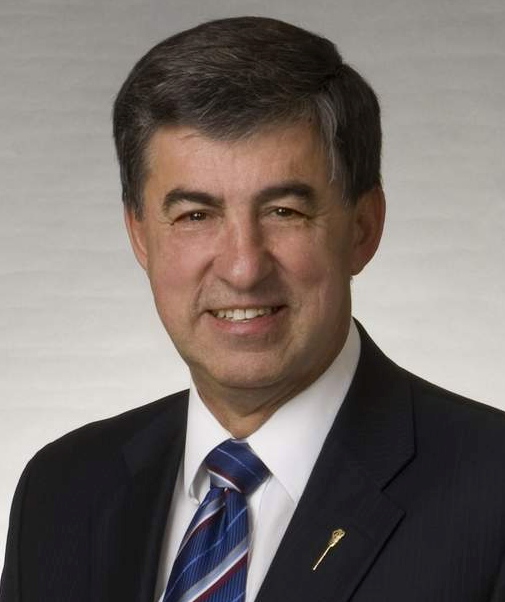In just half an hour, Deputy Premier and Finance Minister Ken Krawetz delivered an optimistic speech during a Humboldt and District Chamber of Commerce luncheon on Nov. 14. His speech focused on population, taxes, employment, Gross Domestic Product (GDP), commodity pricing, and trade.
His visit was to give people up-to-date information on the state of the provincial budget and to answer any questions or concerns people may have. He began by speaking about the increasing population and how immigration may be factor into it.
“Of course immigration is one of those areas (of growth) … We need to work with the federal government to ensure that our foreign worker program and all the other entities that contribute to immigration don’t put obstacles in front of Saskatchewan,” said Krawetz.
Krawetz also talked about how an increasing population is influencing higher school enrollment in the past few years. One of the challenges the province is focusing on is how to attract students and encourage them to remain in the province. Creating an environment conducive to flourishing businesses so they can retain workers can do the former while the Graduate Retention Program (GRP) accomplishes the latter. According to Krawetz, the government knows the program is working because they’ve already seen an expenditure of $83 million in this year’s budget for the GRP.
“What are one of our challenges? Labour force shortage, but we’re moving in the right direction,” he said. “We’re leading the nation in job creation. StatsCan numbers indicate we have the fastest rate of employment growth and the lowest unemployment rate in Canada.”
Regarding taxes, one of the main subjects Krawetz focused on was personal exemption tax. He was quick to say how the government implemented indexation and how the personal exemption was increased by $4,000 back in 2009. Since then, indexation has increased personal exemption by another $1,000 annually, bringing that number up to the current figure of $15,378.
“You’re receiving almost $7,000 worth of income with no tax dollars being paid more than you were five years ago,” he said.
Amongst the many other topics Krawetz touched upon, he went into more extensive detail on expanding Saskatchewan’s international trade. The United States may still be the province’s biggest partner, but efforts are underway to create more inroads into other countries in the east such as India and China. Current trade missions to India will be discussing energy, agriculture, food, and innovation.
Krawetz mentioned how the province is looking to improve its exports. Already, the province is also the largest exporter of commodities such as mustard, flax seed, lentils, and dried pees. It’s also the sixth largest producer of oil in North America, following only Texas, North Dakota, Alaska, California and of course, Alberta.
With regards to oil, Krawetz explained a little of how the recent dip in oil prices has been affecting the budget.
“For the first six months of the year, oil prices were actually above what we had budgeted so for the first six months, we were looking at a cushion,” he said.
“Now, of course, from October to November, we’re seeing a negative drop, which is considerably lower than we had forecast; but again, it’s all a balance. We won’t know for sure what the end result will be in terms of revenue from oil because of that cushion from the first six months.”
On the other hand, the minister also explains that commodity prices are important as well. The agriculture industry, specifically beef and cattle, have seen great prices and cattle producers are being given the opportunity to regain the money they lost during the 2003 BSE (Bovine Spongiform Encephalopathy, better known as “Mad Cow Disease”) incident.
While the entire visit only took a short 45 minutes, the minister touched upon a wide variety of topics. He also clarified for people that he would not be seeking re-election in 2016. Regardless, the premier has asked that he stay on until then, so there is the possibility that he will do post-budget tours again next year.




